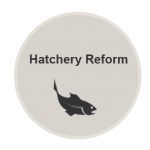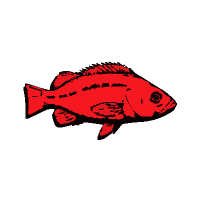About Hatchery Reform

The U.S. Congress established the Hatchery Reform Project in 2000 because it recognized that while hatcheries play a legitimate role in meeting harvest and conservation goals for Pacific Northwest salmon and steelhead, the hatchery system needs comprehensive reform.
The project’s independent scientific review panel reviewed all state, tribal, and federal hatchery programs in the Columbia River Basin, Elwha River, the Puget Sound, and Coastal Washington.
Background
With many species listed as threatened or endangered under the Endangered Species Act (ESA), salmon conservation was a high priority, and many hatchery programs as currently operated were contributing to the risks those stocks were facing. Central to the project was the creation of an independent scientific review panel called the Hatchery Scientific Review Group (HSRG). The HSRG was initially charged with reviewing all state, tribal, and federal hatchery programs in Puget Sound and Coastal Washington and then was asked to expand to other areas. As part of a comprehensive hatchery reform effort, this charge aimed to:
- Conserve indigenous salmonid genetic resources
- Assist with the recovery of naturally spawning salmonid populations
- Provide sustainable fisheries
- Improve the quality and cost-effectiveness of hatchery programs.
Congress funded the Hatchery Reform Project via annual appropriation to the U.S. Fish and Wildlife Service beginning in fiscal year 2000.
HSRG Principles
Three principles emerged early in the HSRG’s review and guided the development of recommendations for hatchery reform. These principles provide a method for incorporating the best available science into policy decisions about the design and operation of hatcheries.
- Principle 1: Develop clear, specific, quantifiable harvest and conservation goals for natural and hatchery populations within an “All H” context.
- Principle 2: Design and operate hatchery programs in a scientifically defensible manner.
- Principle 3: Monitor, evaluate, and adaptively manage hatchery programs.
The HSRG’s three principles are associated with 17 recommendations, which were updated in the HSRG’s 2015 report to Congress. The process of reviewing these recommendations periodically to ensure consistency with new science as it emerges is consistent with Principle 3, which recommends that all hatchery programs should be managed adaptively as new information becomes available.
HSRG Reviews
The final comprehensive review documents and related documents produced by the HSRG of the hatchery programs in the Puget Sound, Coastal Washington, Columbia River Basin, and Elwha River are available on the HSRG Reports and Documents webpage. Documents produced by the HSRG review of specific programs and plans are also available.
HSRG Membership
The members of the HSRG for the Puget Sound and Coastal Washington review were chosen from a pool of candidates nominated by the American Fisheries Society.
The original nine-member HSRG was expanded in 2006 to include individuals with specific knowledge about Columbia River salmon and steelhead. The additional members who joined the HSRG for the Columbia River review were selected by the original HSRG based on their expertise with hatcheries in general and Columbia River programs in particular.
At the end of the project in 2021, the HSRG had 15 members. Seven were affiliated with agencies and tribes in the Pacific Northwest, and eight were unaffiliated biologists. Affiliated members did not represent their agency or tribe but were expected to bring only their individual, scientific expertise to the table.
The intent of this structure and approach was to ensure that the HSRG maintain scientific independence and impartiality while at the same time including members with comprehensive knowledge of salmonid populations and hatchery programs in the regions under review.
New members were appointed according to established by-laws; policies and procedures were updated regularly.
|
Mr. Andy Appleby |
Independent Consultant – Co-Chair |
|
Dr. Brian Beckman |
NOAA Fisheries |
|
Mr. Lee Blankenship |
Independent Consultant – Vice-Chair |
|
Mr. Gary Byrne |
Idaho Department of Fish and Game |
|
Dr. Donald Campton |
U.S. Fish and Wildlife Service |
|
Dr. Ken Currens |
Northwest Indian Fisheries Commission |
|
Mr. Tom Flagg |
Independent Consultant |
|
Ms. Jeannie Heltzel |
Independent Consultant |
|
Mr. Eric Kinne |
Washington Department of Fish and Wildlife |
|
Dr. Peter Paquet |
Independent Consultant – Co-Chair |
|
Mr. Scott Patterson |
Oregon Department of Fish and Wildlife |
|
Dr. Maureen Purcell |
U.S. Geological Survey |
|
Dr. Greg Ruggerone |
Independent Consultant |
|
Dr. Steve Schroder |
Independent Consultant |
|
Dr. Lisa Seeb |
University of Washington |
Mr. John Barr | Independent Consultant – Past Vice-Chair |
Mr. Mike Delarm | NOAA Fisheries |
Dr. Trevor Evelyn | Fisheries and Oceans Canada, Independent Consultant |
Dr. David Fast | Yakama Nation |
Dr. Jeffrey Gislason | Bonneville Power Administration |
Mr. Paul Kline | Idaho Department of Fish and Game |
Dr. Conrad Mahnken | NOAA Fisheries |
Dr. Lars Mobrand | Independent Consultant – Past Chair |
Mr. Robert Piper | U.S. Fish and Wildlife Service, Independent Consultant |
Mr. Paul Seidel | Washington Department of Fish and Wildlife |
Mr. Stephen Smith | Independent Consultant |
Dr. Bill Smoker | University of Alaska, Independent Consultant |

